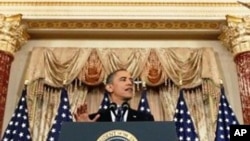President Barack Obama has delivered a major address focusing on the situation in the Arab world. Our correspondent looks at a key issue - the search for a lasting peace in that region.
Analysts say President Obama’s speech was the most comprehensive U.S. statement on the recent uprisings in the Arab world.
Fawaz Gerges, a Middle East expert with the London School of Economics, sees the emergence of an Obama Doctrine.
"President Barack Obama has positioned the United States squarely on the side of the Arab people as opposed to the Arab autocrats and the monarchists," said Gerges. "He talked about self-determination. If there is one particular word that resonates, it is the fact that the president has made it very clear that the United States supports the self-determination of all Arab people."
Regarding the search for a lasting peace in the Middle East, President Obama once again called for negotiations between the Israelis and the Palestinians for a viable Palestine and a secure Israel.
"The United States believes that negotiations should result in two states, with permanent Palestinian borders with Israel, Jordan and Egypt, and permanent Israeli borders with Palestine," said President Obama. "We believe the borders of Israel and Palestine should be based on the 1967 lines with mutually agreed swaps, so that secure and recognized borders are established for both states."
Gerges says that is the most progressive statement on the Arab-Israeli conflict so far.
"He was very explicit - an independent, sovereign, contiguous, viable Palestinian state based on the 1967 borders - the first time ever an American president delineated that the new Palestinian state will be based on the 1967 borders with some exchange of territories," he said.
Analysts say the Israeli and Palestinian sides have to resolve key issues during negotiations. They include the precise borders of a new Palestinian state, what will be its capital, the return of Palestinian refugees and the question of Jewish settlements in the occupied territories.
Alon Ben-Meir, with New York University, says another key issue to address is the recent reconciliation agreement between Palestinian factions - the moderate Fatah organization and the radical Islamist group Hamas.
"Hamas is an organization that still calls for Israel’s destruction and Israel rightfully will say we are not going to negotiate with any entity that is calling for our destruction," said Ben-Meir. "SoHamas and Fatah must sooner or later answer this question: do you want negotiations? If you want negotiations, you have to accept Israel’s right to exist. And this is an issue that no one can compromise on. Israel’s right to exist is not negotiable."
Analysts agree that the Middle East peace process is at a standstill. They also point out that in his speech, President Obama did not offer any concrete steps to move the process further.
Fawaz Gerges says don’t expect any movement anytime soon.
"Even though the president has made one of the most progressive statements on the nature of a Palestinian state, he really left it till his next presidency to deal with the most contentious issues facing the Palestinians and the Israelis," said Gerges.
Alon Ben-Meir says the United States government should work behind the scenes to make sure that on the one hand, all Palestinian factions agree to renounce violence and on the other, that the Israeli government stops the building of settlements in the occupied territories.




